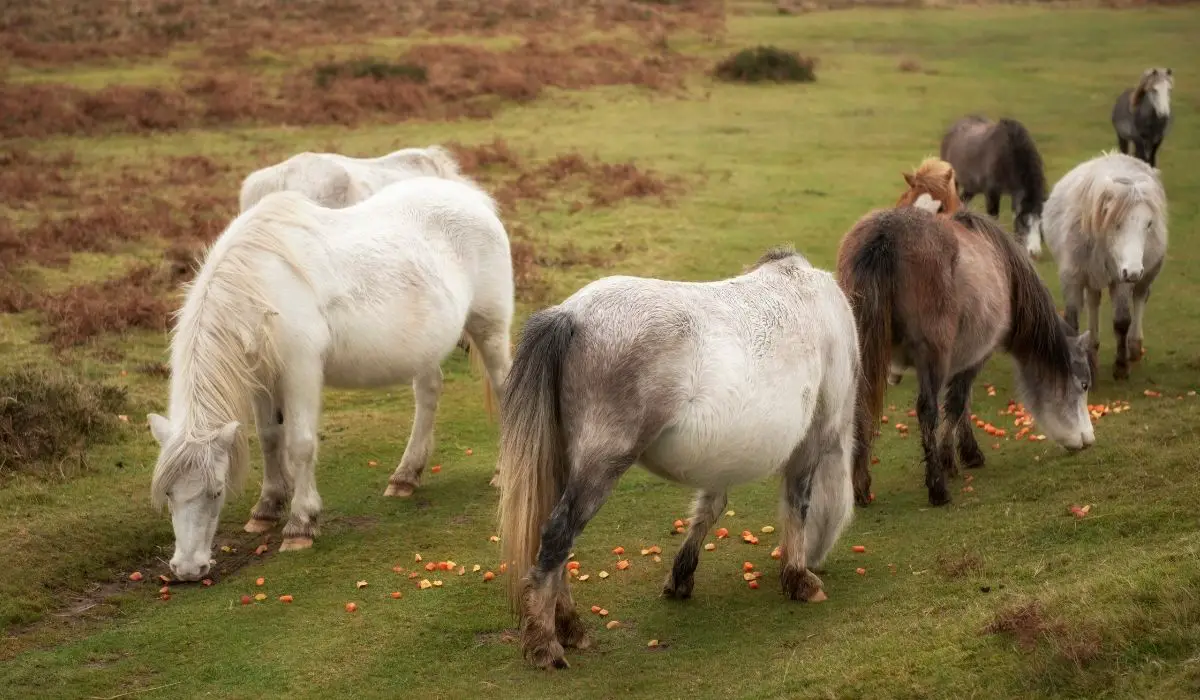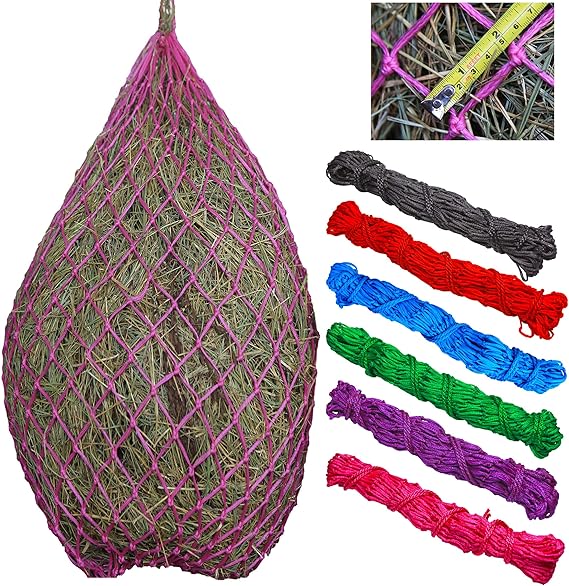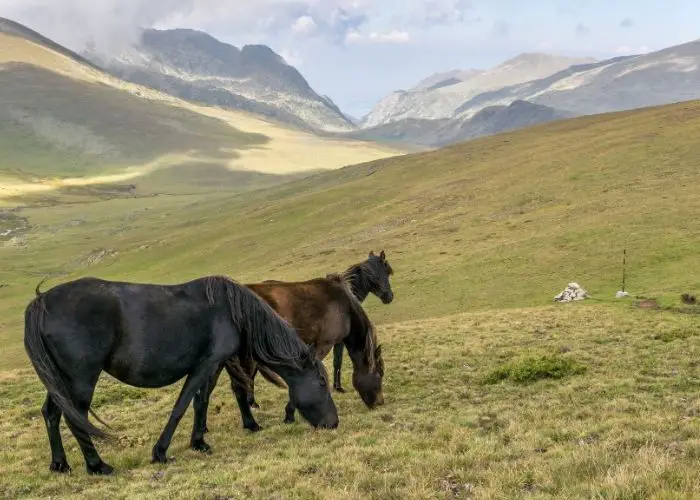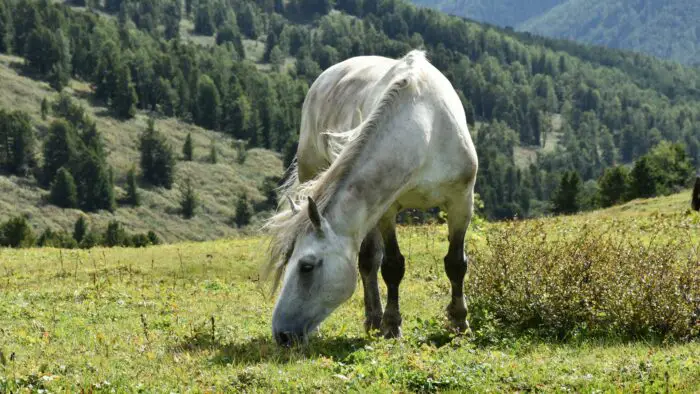Last Updated on April 17, 2023
Any horse lover will know that these huge animals eat a lot! In fact, they seem to always be hungry, and we need to give them an enormous supply of hay and grass to keep them happy. But what do wild horses eat, and how does this compare to our domesticated horses? Let’s find out!
What is the Most Natural Food for Horses?
The digestive system of a horse is an incredibly complex and sensitive series of organs. Horses have undergone thousands of years of evolution to enable them to digest a very specialist diet.
Horses are classified as non-ruminant herbivores. The word herbivore means that they feed on plants. The term non-ruminant means that, unlike other grass-eating mammals such as cattle, horses digest most of their food in the large intestine.
All equines are known as trickle grazers – this means they eat slowly for long periods. They will graze at foodstuffs known as roughage for many hours. In fact, in their natural environment, a horse will spend at least 12 hours per day grazing!
The food that a horse eats is very specific, as its digestive system is uniquely adapted to process only certain foodstuffs. A horse’s natural diet will consist of roughage – this is hay, grass, and herbs. These are the foods that horses have evolved to eat over many thousands of years.
However, if you look at many domesticated horses and you will find that their owners feed them many other types of food as well! It is not uncommon these days to find one or more of the following included in a horse’s diet:
- Cereals
- Beet Pulp
- Vegetable Oil
So, why are these ingredients fed to horses as well as roughage? Domesticated horses are not as hardy and resilient as wild horses, and often need extra calories to maintain their weight. This is particularly important in horses who are doing high levels of work, as they will not get enough energy from roughage to maintain their body weight.
What Do Wild Horses Eat?
If you imagine where horses normally live in the wild, it is a far stretch from the lovely green fields that our domesticated horses graze in! Most wild horses live in hostile and treacherous environments, such as mountains and arid plains. It can be hard to figure out how they survive, so just what do horses eat in the wild?
Well, it is safe to say that wild horses do not have unlimited access to grass and hay! They won’t be tucked into a barn at night with a mix of cereal and alfalfa, and will not have a rug to keep them warm in snowy or wet weather.
You might be surprised to learn that some of the foods that wild horses eat would be shunned by our domesticated horses! The wild horse has a sophisticated palate and can detect which plants are beneficial and which are harmful. Our domesticated horses have lost this ability, and tend to stick to grasses and a few herbs.
Here is a list of the plants that horses will eat in the wild:
-
Grasses
As with domesticated horses, wild horses survive by eating mostly grass. However, they are much less fussy when it comes to the grass they eat! Wild horses will eat grass whether it is short or long and will tuck into any grass that is old and dried up with as much enjoyment as lush green grass.
There are dozens of types of wild grasses, and horses will eat most of these. Whereas our horse pastures tend to contain just a few types of grass, a wild horse will eat many different types of grass every day.
-
Herbs and other plants
You might think of these other things that horses eat as weeds, but in the wild horses will eat a wide variety of plants other than grasses! Many of these herbaceous plants are nutritious and very beneficial to the horse.
Wild horses will instinctively know which plants are safe for them to eat. They use their muzzle and tongue to selectively search as they are grazing, picking only the tastiest and most nutritious foods to eat.
-
Trees and bushes
In our neat and tidy horse paddocks, it is very rare for your equine friend to have access to a tree to nibble on! Most domesticated horses will stick to eating grass, but their wild counterparts will enjoy chewing on the tender parts of trees and bushes.
During springtime, the first food is often the tender young shoots and leaves of trees, bushes, and shrubs. As with grasses and herbaceous plants, the horse will know which of these are safe and tasty to eat. Wild horses may also chew on the bark and wood of trees for additional nutrition benefits.
-
Wild fruits
In the wild horses may come across fruits that are suitable for them to eat. Most commonly they will eat wild apples, which are normally too sour for humans to heat! Horses however will tuck into them with great enjoyment.
Wild horses will sometimes also eat berries and other fruits. As with other foods, wild horses will instinctively know which ones are safe to eat. Your domesticated horse may well have lost this skill, so it is not advisable to feed him anything you can’t identify, just in case it is poisonous!
How Much Does a Horse Eat a Day?
Horses are large, muscular animals and, due to the low-calorie density of their normal foods, need to eat a large amount of food each day. Horses also need to eat a large amount of roughage to keep their gastrointestinal tract functioning normally.
The normal foodstuff of horses is grass or hay, and a good rule of thumb is to feed around 1.5% of a horse’s body weight in hay per day. So, if a horse weighs 1,000 lbs, it should eat around 15 lbs of hay per day. Obviously, when a horse is out on grass we have no way of monitoring how much grass it is eating, so the best guide is to be vigilant as to the horse’s weight and signs of obesity, and alter the amount of time the horse spends out at grass accordingly.
Horses with high energy needs, such as those in hard physical work, pregnant or lactating mares, or young fast-growing horses, may not receive all the nutrients and energy they need from hay and grass alone. In these situations, it may be necessary to supplement their diet with energy-dense feeds that are high in carbohydrates, fats, or proteins.
Carbohydrate-based feeds for horses normally consist of cereal grains, whilst fats can be added by supplementing the feed with various vegetable oils. High protein feeds for horses are normally based on legumes such as lucerne. The optimum energy source for your horse will vary according to their life stage and nutritional needs, so it is always a good idea to consult with a qualified equine nutritionist first.
Can Horses Eat Straw?
Some types of straw can be fed to horses, and it can be a useful feed source for certain types of horses. Most straw is very low in calories, making them a good source of fiber for horses on a weight-loss program. However, there are some other types of straw manufactured specifically for horses that can be higher in energy than standard hay.
Straw is often mixed with hay for horses that are overweight or obese, and these horses have been shown to lose weight faster than those fed on hay alone. Some straws are chopped into chaff and fed to horses as part of their concentrated feed.
What Can Horses Not Eat?
Horses are herbivores, meaning they should only eat plant material. Never feed your horse dairy or meat-based food products, and avoid foods with high levels of sugar, salt, or artificial additives.
While horses will browse a wide variety of plants, herbs, bushes, and trees, some plants are poisonous to horses and others can cause unpleasant side effects. The plants that are toxic to horses will vary from region to region, so it is a good idea to become familiar with the wild plants that grow in your area.
Certain vegetables are also poisonous to horses, including those within the nightshade family – potatoes, tomatoes, eggplant, and peppers. Onions and rhubarb are also toxic to horses, and all types of cabbage can cause unpleasant excess gas and bloating of the intestines.
Summary – What Do Wild Horses Eat?
So, as we have learned, in the wild horses eat mostly grasses and herbs. The digestive system of a horse is highly adapted to eat a high-roughage diet, and wild horses will thrive by grazing for most of their waking hours. As horse owners, we should aim to keep their diet as close to their wild counterparts as possible.
We’d love to hear your thoughts on what horses eat in the wild. Are you a fan of keeping your horse in the most natural way possible? Or maybe your horse needs extra feed to keep him in good condition? Add your comments below and we’ll get back to you!
Find out How Much Do Jockeys Weigh?

Kate Chalmers is a qualified veterinary nurse who has specialized in horse care for the vast majority of her career. She has been around horses since she was a child, starting out riding ponies and helping out at the local stables before going on to college to study Horse Care & Management. She has backed and trained many horses during her lifetime and competed in various equestrian sports at different levels.
After Kate qualified as a veterinary nurse, she provided nursing care to the patients of a large equine veterinary hospital for many years. She then went on to teach horse care and veterinary nursing at one of the top colleges in the country. This has led to an in-depth knowledge of the care needs of horses and their various medical ailments, as well as a life-long passion for educating horse owners on how to provide the best possible care for their four-legged friends.
Kate Chalmers BSc (Hons) CVN, Dip AVN (Equine) Dip HE CVN EVN VN A1 PGCE




